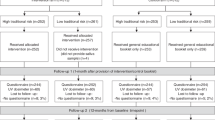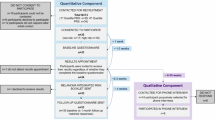Abstract
The aim of this research was to understand how genomics-based personal melanoma risk information impacts psychological and emotional health outcomes in the general population. In a pilot randomized controlled trial, participants (n = 103) completed the Multidimensional Impact of Cancer Risk Assessment (MICRA) questionnaire, 3 months after receiving personal melanoma genomic risk information. Mean scores for MICRA items and subscales were stratified by genomic risk group (low, average, high), gender, education, age, and family history of melanoma. P values were obtained from t-tests and analysis of variance tests. We found that overall, participants (mean age: 53 years, range: 21–69; 52% female) had a total MICRA mean score of 18.6 (standard deviation: 11.1, range: 1–70; possible range: 0–105). The high genomic risk group had higher mean scores for the total (24.2, F2,100 = 6.7, P = 0.0019), distress (3.3, F2,100 = 9.4, P = 0.0002) and uncertainty (8.5, F2,100 = 6.5, P = 0.0021) subscales compared with average (17.6, 1.1, and 4.5, respectively) and low-risk groups (14.1, 0.5, and 2.5, respectively). Positive experiences scores were consistent across risk groups. In conclusion, MICRA scores for the total, distress and uncertainty subscales in our study were relatively low overall, but people who receive a high genomic risk result may benefit from increased support following testing.
Similar content being viewed by others
Log in or create a free account to read this content
Gain free access to this article, as well as selected content from this journal and more on nature.com
or
References
Green ED, Guyer MS, National Human Genome Research I. Charting a course for genomic medicine from base pairs to bedside. Nature. 2011;470:204–13.
Burton H, Chowdhury S, Dent T, Hall A, Pashayan N, Pharoah P. Public health implications from COGS and potential for risk stratification and screening. Nat Genet. 2013;45:349–51.
Kiviniemi MT, Voss-Humke AM, Seifert AL. How do I feel about the behavior? The interplay of affective associations with behaviors and cognitive beliefs as influences on physical activity behavior. Health Psychol. 2007;26:152–8.
O’Neill SC, Tercyak KP, Baytop C, Hensley Alford S, McBride CM. A new approach to assessing affect and the emotional implications of personal genomic testing for common disease risk. Public Health Genom. 2015;18:104–12.
Bloss CS, Wineinger NE, Darst BF, Schork NJ, Topol EJ. Impact of direct-to-consumer genomic testing at long term follow-up. J Med Genet. 2013;50:393–400.
Godino JG, van Sluijs EM, Marteau TM, Sutton S, Sharp SJ, Griffin SJ. Lifestyle advice combined with personalized estimates of genetic or phenotypic risk of type 2 diabetes, and objectively measured physical activity: a randomized controlled trial. PLoS Med. 2016;13:e1002185.
Hollands GJ, French DP, Griffin SJ, et al. The impact of communicating genetic risks of disease on risk-reducing health behaviour: systematic review with meta-analysis. BMJ. 2016;352:i1102.
Cella D, Hughes C, Peterman A, et al. A brief assessment of concerns associated with genetic testing for cancer: the Multidimensional Impact of Cancer Risk Assessment (MICRA) questionnaire. Health Psychol. 2002;21:564–72.
Graves KD, Vegella P, Poggi EA, et al. Long-term psychosocial outcomes of BRCA1/BRCA2 testing: differences across affected status and risk-reducing surgery choice. Cancer Epidemiol Biomark Prev. 2012;21:445–55.
Lewis KL, Hooker GW, Connors PD, et al. Participant use and communication of findings from exome sequencing: a mixed-methods study. Genet Med. 2016;18:577–83.
Sanderson SC, Linderman MD, Suckiel SA, et al. Psychological and behavioural impact of returning personal results from whole-genome sequencing: the HealthSeq project. Eur J Hum Genet. 2017;25:280–92.
Smit AK, Espinoza D, Newson AJ, et al. A pilot randomized controlled trial of the feasibility, acceptability, and impact of giving information on personalized genomic risk of melanoma to the public. Cancer Epidemiol Biomark Prev. 2017;26:212–21.
Fenton GL, Smit AK, Freeman L. et al. Development and evaluation of a telephone communication protocol for the delivery of personalized melanoma genomic risk to the general population. J. Genet. Couns. 2017; https://doi.org/10.1007/s10897-017-0183-7.
Law MH, Bishop DT, Lee JE, et al. Genome-wide meta-analysis identifies five new susceptibility loci for cutaneous malignant melanoma. Nat Genet. 2015;47:987–95.
Yokoyama S, Woods SL, Boyle GM, et al. A novel recurrent mutation in MITF predisposes to familial and sporadic melanoma. Nature. 2011;480:99–103.
Smit AK, Keogh LA, Hersch J, et al. Public preferences for communicating personal genomic risk information: a focus group study. Health Expect. 2016;19:1203–14.
Smit AK, Keogh LA, Newson AJ, Hersch J, Butow P, Cust AE. Exploring the potential emotional and behavioural impact of providing personalised genomic risk information to the public: a focus group study. Public Health Genom. 2015;18:309–17.
Hawley ST, Zikmund-Fisher B, Ubel P, Jancovic A, Lucas T, Fagerlin A. The impact of the format of graphical presentation on health-related knowledge and treatment choices. Patient Educ Couns. 2008;73:448–55.
Lautenbach DM, Christensen KD, Sparks JA, Green RC. Communicating genetic risk information for common disorders in the era of genomic medicine. Annu Rev Genom Hum Genet. 2013;14:491–513.
45 And Up Study C, Banks E, Redman S, et al. Cohort profile: the 45 and up study. Int J Epidemiol. 2008;37:941–7.
van der Heide I, Wang J, Droomers M, Spreeuwenberg P, Rademakers J, Uiters E. The relationship between health, education, and health literacy: results from the Dutch Adult Literacy and Life Skills Survey. J Health Commun. 2013;18:172–84.
Bjornslett M, Dahl AA, Sorebo O, Dorum A. Psychological distress related to BRCA testing in ovarian cancer patients. Fam Cancer. 2015;14:495–504.
Kaphingst KA, McBride CM, Wade C, et al. Patients’ understanding of and responses to multiplex genetic susceptibility test results. Genet Med. 2012;14:681–7.
Smit AK, Keogh LA, Newson AJ et al. Does personalized melanoma genomic risk information trigger conversations about skin cancer prevention and skin examination with family, friends and health professionals? Br J Dermatol 2017;177:779–790.
Halbert CH, Stopfer JE, McDonald J, et al. Long-term reactions to genetic testing for BRCA1 and BRCA2 mutations: does time heal women’s concerns? J Clin Oncol. 2011;29:4302–6.
Berwick DM, Murphy JM, Goldman PA, Ware JE Jr, Barsky AJ, Weinstein MC. Performance of a five-item mental health screening test. Med Care. 1991;29:169–76.
Acknowledgements
This study received funding from Sydney Catalyst Translational Cancer Research Centre and The University of Sydney Cancer Strategic Priority Area for Research Collaboration (SPARC) Implementation Scheme. AE Cust received Career Development Fellowships from the National Health and Medical Research Council of Australia (NHMRC; 1147843) and Cancer Institute NSW (15/CDF/1-14). AK Smit received a Research Training Program (RTP) Stipend Scholarship and a Merit Top Up Scholarship from the University of Sydney, and a Top Up Scholar Award from the Sydney Catalyst Translational Cancer Research Centre.
Author information
Authors and Affiliations
Corresponding author
Ethics declarations
Conflict of interest
The authors declare that they have no conflict of interest.
Electronic supplementary material
Rights and permissions
About this article
Cite this article
Smit, A.K., Newson, A.J., Best, M. et al. Distress, uncertainty, and positive experiences associated with receiving information on personal genomic risk of melanoma. Eur J Hum Genet 26, 1094–1100 (2018). https://doi.org/10.1038/s41431-018-0145-z
Received:
Revised:
Accepted:
Published:
Issue date:
DOI: https://doi.org/10.1038/s41431-018-0145-z
This article is cited by
-
Reliability and validity of the multidimensional impact of cancer risk assessment (MICRA) questionnaire: Japanese version
Familial Cancer (2025)
-
A qualitative study exploring the consumer experience of receiving self-initiated polygenic risk scores from a third-party website
European Journal of Human Genetics (2023)
-
Psychometric Properties of the MICRA Questionnaire in Portuguese Individuals Carrying SDHx Mutations
Journal of Cancer Education (2020)



